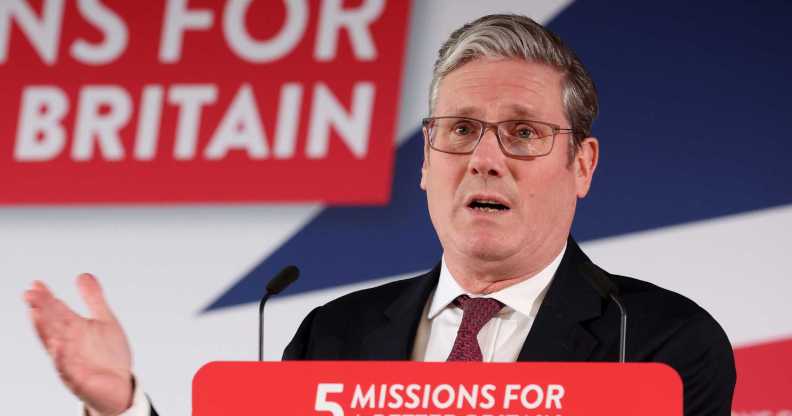Keir Starmer says Scotland gender reforms lacked ‘public confidence’. He’s wrong

Labour leader Keir Starmer speaks during a press conference at Port Vale Football Club (Nathan Stirk/Getty Images)
Labour leader Sir Keir Starmer has claimed Scotland’s landmark gender reforms did not have the confidence of the Scottish people.
On Thursday (23 March), Starmer unveiled Labour’s mission to halve violent crime and win back confidence in the police and the criminal justice system, if the party wins the next general election.
After delivering the speech at Port Vale FC, in Stoke-on-Trent, Starmer took questions from the media and addressed whether Labour was still committed to updating the Gender Recognition Act to enable self-ID for trans people. He made promises to reform the act in 2021.
“What we learned from Scotland is that you don’t make changes that you can’t bring the public along with, which is why in Scotland they should reset the situation,” the Labour leader said.
“There are lessons [to be learnt] from Scotland and the primary lesson is that changes which don’t carry public confidence are almost certainly not the right changes.”
In December, the Scottish parliament passed the Gender Recognition Reform (Scotland) bill by 86 votes to 39, following six years of consultation.
The bill was labelled a landmark move for LGBTQ+ rights, with its aim to make it more simple and fair for trans people to update the sex marker on their birth certificates.
During the lengthy consultation period, Scotland’s government received more than 30,000 responses, making the consultation one of the largest Holyrood has ever untaken, and research carried out for the BBC found that more than half of Scots (57 per cent) believed it should be easier for people to be able to get a Gender Recognition Certificate (GRC).
However, despite political and public support, in January, Westminster announced it would block the devolved nation’s bill from gaining royal assent – and becoming law – by using Section 35 of the Scotland Act 1998.
The move was lambasted by LGBTQ+ activists and politicians at Holyrood, with Nicola Sturgeon describing it as a “full-frontal attack on democracy”.
In Stoke, Starmer said Labour has a “very, very clear position” on balancing the rights of women and trans people – although it is not clear how the party would mitigate any concerns.
“I started my personal involvement on violence against women and girls in 2008 when I became director of public prosecutions and worked with a lot of victims groups, a lot of women’s groups, to change the way in which we prosecuted those cases,” Keir Starmer said, reports The Express.
“So, this is a long history with me. Partly because of that, I do feel very strongly about this, which is why we have made real and significant progress when it comes to women’s rights, and we must not roll back or retreat from any of that.”
“[Safe spaces] have to be a very important priority, as far as I am concerned, and we cannot roll back on that.”

